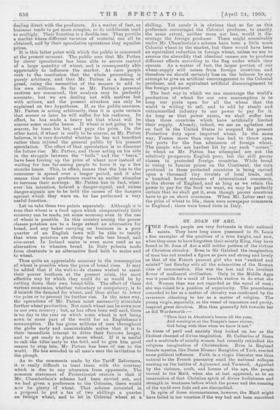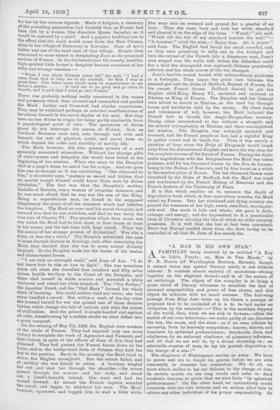ST. JOAN OF ARC.
THE French people are very fortunate in their national saints. They have long since possessed in St. Lopis a fine exemplar of the qualities of a true knight, and now, when they seem to have forgotten their saintly King, they have found in St. Joan of Arc a still nobler pattern of the virtues of Christian chivalry. Even in Sir Galahad the imagination of man has not created a figure as pure and strong and lovely as that of the French peasant girl who was " enskied and sainted" last Sunday with all the solemnities of the nom an rites of canonisation. She was the last and the loveliest flower of mediaeval civilisation. Only in the Middle Ages Was it possible for a maid of humble station to do what she did. Woman then was not regarded as the equal of man ; she was raised to a position of superiority. The precedence conceded to her as a matter of chivalry was confirmed by the reverence attaching to her as a matter of religion. The young virgin, especially, as the vessel of innocence and purity, inspired great devotion. Men then generally felt towards her as did Wordsworth :— "Thou liest in Abraham's bosom all the year,
And worship'st at the Temple's inner shrine; God being with thee when we know it not."
In times of peril and anxiety they looked on her as the likeliest channel of divine inspiration. St. Catherine of Siena and a multitude of saintly women had recently rekindled the religious imagination of Christendom. Even in England female mystics, like Dame Eleanor Raughton of York, exerted some political influence. Faith in a virgin liberator was thus natural to the French peasantry amid the national collapse ensiling on the battles of Agincourt and Verneuil. Appalled by the violence, craft, and liuense of the age, the people turned, to the Maid, when she at last appeared, as to an incarnation of that Christian spirit of divine foolishness and strength in weakness before which the power and the cunning of the world aver fade and are discomfited. • .
In spite of these circumstances, however, the Maid might have failed in her vocation if the way had not been smoothed for her by two curious legends. Marie d'Avignon, a visionary of the preceding generation, had foretold that as France had
been lost by a. woman .(the dissolute Queen Ieabella), so it would be restored by a maid. And a popular tradition ran to
the effect that the maid would come from the Bois Chesnu, close to the village of Domremy in Lorraine. Joan of Arc's father was one of the head men of this village. Events thus concurred to some extent in designating Joan as the promised eaviour of France. In her thirteenth year the comely, sensible, high-apirited little farmer's daughter became conscious of her lofty and strange vocation
"When I was about thirteen years old," she said, "I had a voice from God to help me in my conduct. At first I was in great fear, The voice ett1110 about noon in summertime in my
father's garden It told me to be good and go often to Church, and it said that I must go into France."
There was probably nothing really unnatural in the voices and preaences Which thus aroused and counselled and guided the Maid. Luther and Cromwell bad similar experiences. They may be explained perhaps as external manifestations of intuitions formed in the secret depths of the soul. But they were no less divine in origin, for being partly explicable from psychological point of view. The operations of divine grace do not interrupt the course of Nature. • God, as Cardinal Newman once said, acts through and with and beneath the web of physical, .social, and moral ' laws on which depend the order and stability of earthly life.
• The Maid, however, did also possess powers of a sort generally accounted miraculous. Without her strange gifts of clairvoyance and telepathy she would have failed at the beginning of her mission. When she came to the Dauphin clad in a page's dress, he naked her for a sign. And she gave him one as strange as it was convincing. "She rehearsed to him," a chronicler says, "matters so secret and hidden that no mortal except himself could know them save by divine revelation." The fact was that, the Dauphin's mother, Isabella of Bavaria, was a woman of irregular manners, and he was much afraid that he was not the son of the King. Being a superstitious man, he found in his supposed illegitimacy the cause of all the disasters which had befallen the kingdom. The Maid at once read his secret thoughts, and assured him that he was mistaken, and that he was verily the true heir of Charles VI. The question which then arose was one which the Maid had to face three or four times at least in her career, and the last time with fatal result. What was the source of her strange powers of divination P Was she a saint, or was she a witch ? The Dauphin submitted the case to some learned doctors in theology, and, after examining the
Maid, they decided that she was to some extent divinely inspired. So the Dauphin made her the leader of his beaten and disheartened forces.
"I am only an untaught maid," said Joan of Arc. "I do net know bow to ride or how to fight." She was seventeen Yeats old when she travelled four hundred and fifty miles across hostile territory to the Court of the Dauphin, and there clad herself in white armour and mounted a white 'warhorse and raised her white standard. The "Our Father," the Apostles' Creed, and the "Hail Mary" formed her whole stock of learning. She could neither read nor write; she had never handled a sword. But within a week of the day when she dressed herself for war she gained one of those decisive battles which change the fate of nations and alter the course of civilisation. And she gained it single-handed and against all odds, transforming by a sudden stroke an utter defeat into a great conquest.
On the evening of May 7th, 1429, the English were masters of the whole of France. They had required only one more 'victory to complete the work of Agincourt and Verneuil, and that victory, in spite of the efforts of Joan of Are, they had obtained. They had pushed the French forces down to the Loire, and in the bridge-head forts of Orleans they held the key to the position. Early in the morning the Maid tried to storm the English stronghold. But the attack failed, and at !midday she was forced to retire. A bowman singled her out and shot her through the shoulder,—the arrow Passed through her armour and her body, and stood out a hand's-breadth behind. She went and had the wound dressed. At sunset the French captain sounded the moan, and began to withdraw his men. The Maid, however, appeared, and begged him to wait a little while. She went into an orchard and prayed for a quarter of an hour. Then she came back and took her white standard and planted it On the edge of the fosse. "Watch!" she said. "Watch till the tail of my standard touches the wall !"— "It touches!" cried the men.—" Enter then, All is yours 1" said Joan. The English had heard the recall sounded, and, as they were preparing to sally out in the twilight awl turn the retreat of the French into a disastrous rout, Joan's men surged over the walls, and before the defenders could fire a shot the stronghold was captured, Orleans practically relieved, and the whole course of the war changed.
Joan's terrible wound healed with extraordinary quickness • in a fortnight. Then began the great race between the peasant girl and the Duke of Bedford, Regent of France, for the vacant French throne. Bedford desired to get the English child-King, Henry VI., anointed and crowned at Rheims as King of France. The Dauphin and his Council were afraid to march to Rheitne, as the road lay through towns and territories held by the enemy. By sheer force and vehemence of will, however, the Maid induced' the French heir to invade the Anglo-Burgundian country. Strong cities surrendered to her without a struggle, and she arrived triumphantly at Rheims, and there accomplished her mission. The Dauphin was solemnly anointed and crowned, and the French people at last had a rightful King to gather round and do battle for. Then it was merely a question of time when the Duke of Burgundy would break away from the disheartened English, and leave the way clear for the complete success of the forces of France. During the diplo- matic negotiations with the Burgtmdians the Maid was taken prisoner, sold for ten thousand francs by the Sire de Luxem- bourg to the Bishop of Beauvais, and by him burnt as a witch in the market-place of Rouen. The ten thousand francs were furnished by the Duke of Bedford, but the Maid was tried and condemned by the French Bishop. of Beauvais and the French doctors of the University of Paris.
It is this which enables us to. measure the depth of degradation from which, in four marvellous months, the .Maid raised up France. Into her shattered and dying country she poured the treasures of her high, sweet, steadfast, unconquer- able soul. She made it hale and whole; she gave it faith, courage, and energy; and she bequeathed to it, a practicable ideal of Christian chivalry the like of which no other country possesses. It is well that she has at last 'been canonised. Never has Europe needed more than she does today to be reminded of all that St. Joan of Arc stands for.























































 Previous page
Previous page